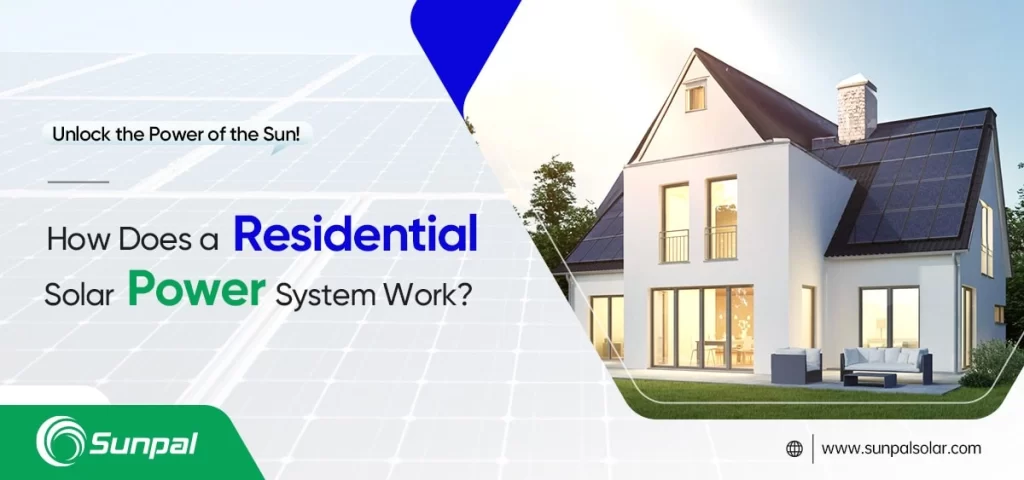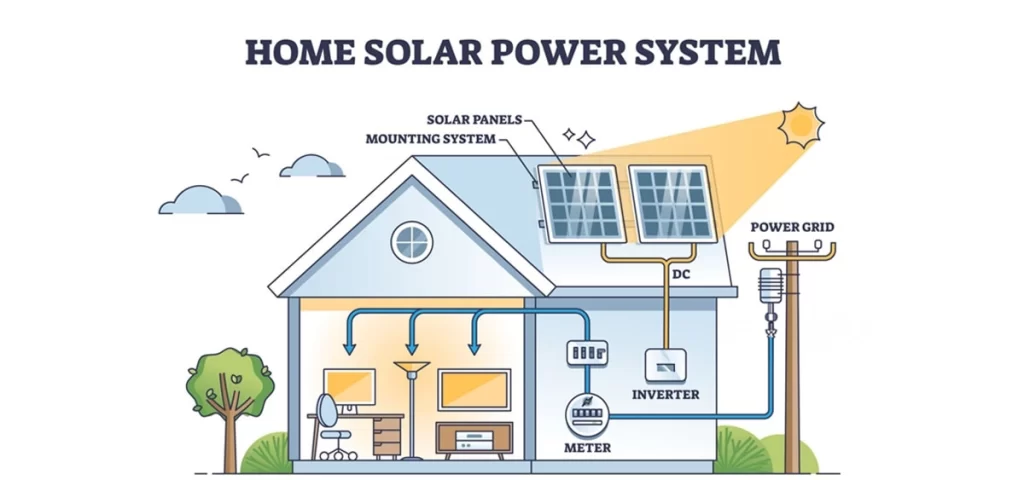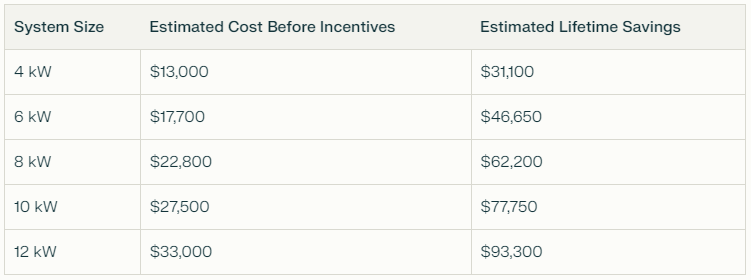
Are you curious about how a solar power system for private households works?
If you're thinking about powering your home with solar energy, it's important to understand how these systems work.
Solar energy is more than just a trend; it's a sustainable solution that can help you save on energy costs and reduce your carbon footprint.
In this comprehensive guide, we will break down the components and processes involved in residential solar power systems.
We’ll also discuss the benefits of going solar, how you can optimize your system and how Sunpal Solar can help you harness the sun's energy effectively.
Let’s get started!
What is a Residential Solar Power System?
A residential solar power system is designed to convert sunlight into electricity for home use.
These systems typically have several key components that work together to generate and manage solar energy effectively.
Key Components of How Residential Solar Power Systems Work
1. Solar Panels: The main component that captures sunlight.
2. Inverter: Converts the direct current (DC) generated by the solar modules into alternating current (AC), which is used in the house.
3. Electrical Panel: Distributes the electricity throughout the house.
4. Energy Storage (Optional): Batteries that store excess electricity for later use.
5. Net Metering System: Allows homeowners to return excess energy to the grid for credits.
Schematic Diagram of a Residential Solar Power System

How Do Solar Panels Generate Electricity?
Solar panels generate electricity through a process called the photovoltaic effect.
This is how it works:
The Photovoltaic Effect Explained
- Photons from Sunlight: When sunlight hits a solar module, it excites electrons in the semiconductor material (usually silicon).
- Electron Movement: This movement generates an electric current as the electrons flow through the material.
- Direct Current (DC): The electricity generated is direct current and needs to be converted for home use.
Типи сонячних панелей
There are different types of solar panels available, each with its own advantages:

The Role of Inverters in Residential Solar Power Generation Systems
Once solar panels generate DC electricity, it must be converted into AC electricity to be usable in your home.
This is where the inverter comes into play.
Types of Inverters
1. String Inverters: Connect multiple panels; cost-effective but can reduce efficiency if one panel is shaded.
2. Microinverters: Attached to each panel; optimize performance individually and improve overall system efficiency.
Functionality of Inverters
- Convert DC to AC electricity.
- Monitor system performance.
- Provide safety features by shutting down during faults.
Connecting to the Electrical Panel
The AC electricity flows from the inverter to your home’s electrical panel.
From there, it distributes power to your lights, appliances, and other electrical devices.
Як це працює
- Your electrical panel acts as a hub for managing energy flow throughout your home.
- If your solar panels produce more energy than you need, excess power can be returned to the grid or stored in batteries.
Net Metering: Maximizing Benefits of Residential Solar Power Systems
Many residential solar systems are connected to the grid through net metering.
This allows homeowners to earn credits for excess energy produced by their solar panels.
Benefits of Net Metering
- Offsets energy costs during non-sunny hours.
- Provides financial incentives for producing renewable energy.
- Helps maintain a reliable energy supply when solar production is low.
Energy Storage Solutions For Residential Solar Power Systems
To maximize the benefits of a residential solar system, many homeowners opt for battery storage solutions.
These batteries store excess energy generated during sunny days for use at night or during cloudy weather.
Why Consider Energy Storage?
Increases your energy independence.
Provides backup power during outages.
Enhances overall system efficiency by using stored energy when needed.
Benefits of Understanding How Residential Solar Power Systems Work
Understanding how residential solar systems work can empower you as a homeowner.
Here are some key benefits:
- Економія коштів: Knowing how much energy you generate helps you manage your electricity bills effectively.
- Вплив на навколишнє середовище: By using renewable energy, you contribute to reducing carbon emissions.
- Informed Decisions: Understanding system components enables you to make better choices when selecting products and services.
Common Myths About How a Residential Solar Power System Works
There are several misconceptions surrounding residential solar systems.
Let’s debunk some common myths:
Myth 1: Solar Panels Only Work in Sunny Climates
Truth: Solar panels can generate electricity even on cloudy days.
Myth 2: Installing Solar Panels is Too Expensive
Truth: With incentives and long-term savings on energy bills, solar can be a cost-effective investment.
Myth 3: Homeowners Need to Be Tech-Savvy
Truth: Most systems come with user-friendly interfaces and monitoring apps.
Optimizing Your Home for How a Residential Solar Power System Works
To get the most out of your residential solar system, consider these tips:
- Roof Orientation: Ideally, install panels on a south-facing roof with minimal shading.
- Energy Efficiency: Prioritize energy-efficient appliances and lighting to reduce overall consumption.
- Регулярне технічне обслуговування: Keep your solar panels clean and check for any obstructions that may block sunlight.
Cost Considerations for How a Residential Solar Power System Works
Investing in a residential solar system involves several costs that vary based on location and specific needs:

Note: Costs will vary based on local electricity rates and available incentives.
Frequently Asked Questions (FAQs) About How a Residential Solar Power System Works
1. What is the lifespan of a residential solar system?
Most residential solar systems are designed to last between 25 to 30 years.
Solar panels typically come with warranties ranging from 20 to 25 years, ensuring that they maintain a certain level of efficiency throughout their lifespan.
2. How much maintenance do residential solar systems require?
Solar systems require minimal maintenance.
It's recommended to clean the panels periodically to remove dust, dirt, or debris that may block sunlight.
Additionally, having a professional inspection every few years can help ensure everything is functioning properly.
3. Can I install a residential solar system myself?
While some homeowners choose to install solar systems as DIY projects, it’s generally advisable to hire professionals.
Proper installation is crucial for safety and efficiency, and many local regulations require permits and inspections that professionals are familiar with.
4. Що станеться, якщо мої сонячні панелі виробляють більше енергії, ніж я використовую?
If your solar panels generate more electricity than your home needs, the excess energy can often be sent back to the grid through net metering.
This allows you to earn credits on your electricity bill for future use, effectively offsetting costs when your system isn’t producing energy (like at night).
5. Are there any financial incentives for installing residential solar systems?
Yes! Many regions offer financial incentives for installing solar systems, including tax credits, rebates, and grants.
These incentives can significantly reduce the upfront costs of installation and improve the return on investment for homeowners.
6. How do I know if my home is suitable for solar panels?
Several factors determine if your home is suitable for solar panels:
- Roof Orientation: Ensure it faces south or southwest for optimal sunlight exposure.
- Shade: Check for trees or buildings that might cast shadows on your roof.
- Roof Condition: Make sure your roof is in good shape before installation.
- Local Climate: While sunny climates are ideal, most modern panels perform well even in less sunny conditions.
7. What type of solar panel is best for residential use?
The best type of solar panel depends on your specific needs and budget:
- Монокристалічні панелі: Offer high efficiency but tend to be more expensive.
- Полікристалічні панелі: More affordable but slightly less efficient than monocrystalline options.
- Thin-Film Panels: Lightweight and flexible but generally have lower efficiency rates compared to crystalline options.
8. How do weather conditions affect residential solar systems?
Weather conditions can impact the performance of solar panels:
- Sunny Days: Maximum energy production occurs.
- Cloudy Days: Solar panels still generate electricity but at reduced efficiency.
- Rain/Snow: Rain can help clean the panels; snow may temporarily block sunlight until it melts away.
9. Can I expand my residential solar system later?
Yes! Many homeowners start with a smaller system and expand it later as their energy needs grow or finances allow.
However, it’s essential to consult with a professional installer to ensure that any expansion is compatible with your existing setup.
10. What should I consider when choosing a solar provider?
When selecting a provider for your residential solar system, consider:
- Experience and Reputation: Look for companies with positive reviews and proven track records.
- Product Quality: Ensure they offer high-quality panels and inverters that meet industry standards.
- Warranty Options: Check what warranties are available for both products and installation services.
- Customer Support: Choose a provider known for responsive customer service throughout your ownership experience.
Conclusion: Embrace the Future with Understanding How a Residential Solar Power System Work
Understanding how a residential solar power system works is crucial for anyone considering making the switch to solar energy.
With companies like Sunpal Solar providing innovative solutions tailored specifically for modern architecture, integrating renewable technology into building designs has never been more accessible or attractive.
If you're ready to take control of your energy future and reduce your carbon footprint while enjoying significant savings on utility bills, now is the time to explore your options further!
You can easily buy solar panels or customized solar systems from a reliable manufacturer directly through our website at sunpalsolar.com.
